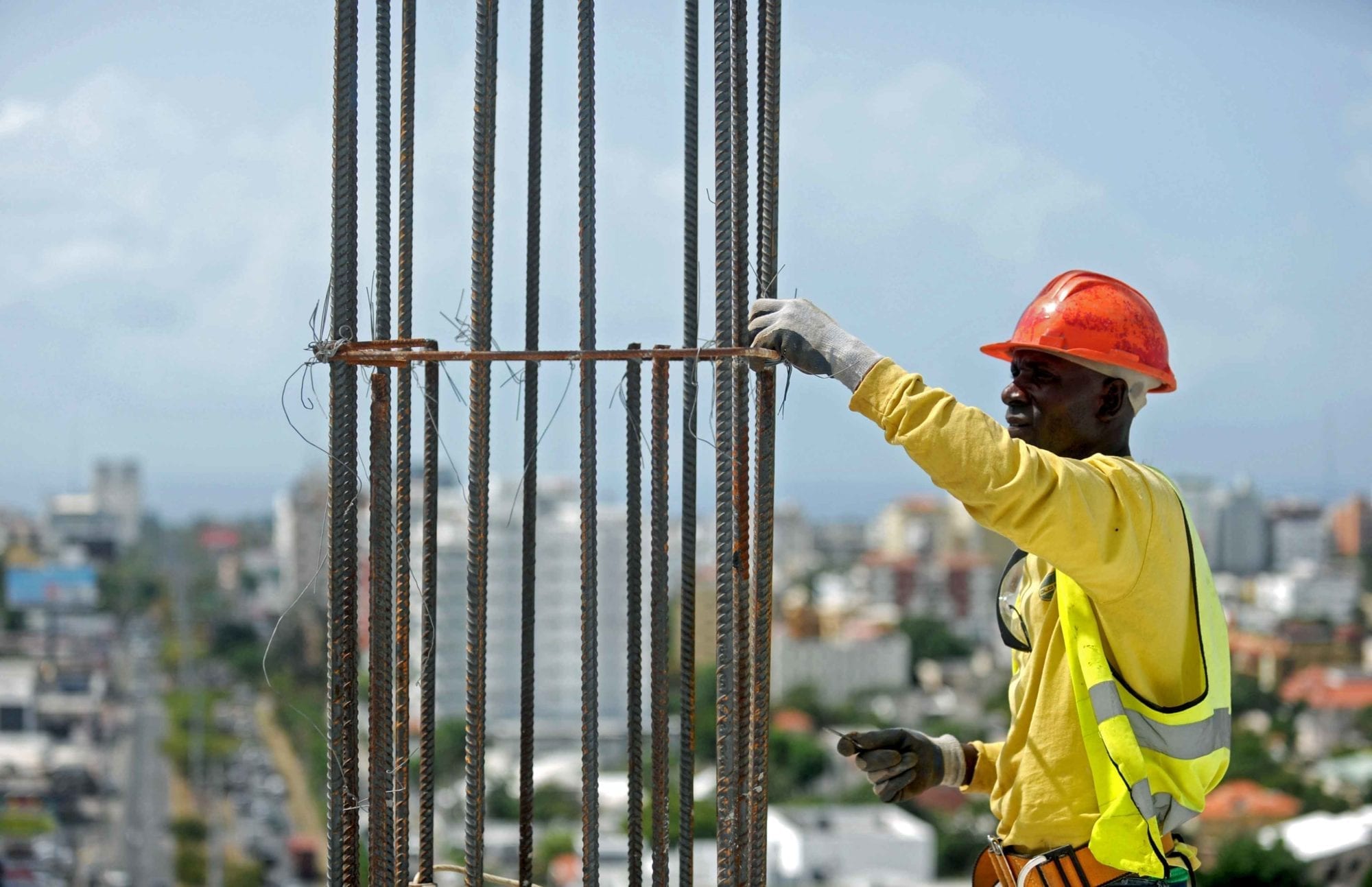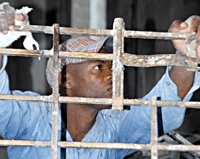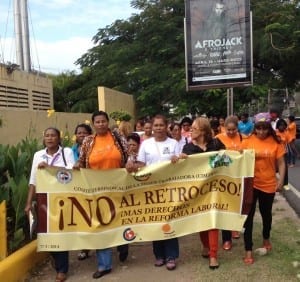
Sep 5, 2014
The Dominican Republic’s “regularization” plan—created to provide legal status to migrants with documents—is rife with “irregularities,” according to Alexis Roselie, spokeswoman for the National Coordinator for Immigration Justice and Human Rights and an organizer for the National Federation of Workers in Construction and Building Materials (FENTICOMMC).
At a press conference this week at the National Confederation of Union Unity (CNUS), Roselie said that “after three months of execution of the plan … only 19 offices of the 31 previously announced offices are functioning.” Roselie referred to offices the Dominican government recently opened around the country to receive applications from migrants to legalize their status.
She says regular bureaucratic processes are being set aside and applicants are not receiving proper documentation of their interactions with the relevant agencies.
“We have proof there are people who meet all the basic requirements of the National Plan for Regularization of Foreigners (PNRE) and each time they go back to the offices, they are always told they are lacking one document or another,” Roselie said. Tens of thousands of migrant workers, primarily Haitians, toil in the Dominican Republic as domestic workers, sugarcane harvesters and construction workers.
CNUS President Rafael is bringing the groups concerns today in a meeting with Dominican Republic President Danilo Medina.
The National Coordinator for Immigration Justice and Human Rights is a network of 16 organizations, including CNUS, FENTICOMMC, the Association of Domestic Workers, the National Federation of Market Vendors and other unions and grassroots migrant community organizations. The coordination of these organizations emerged from an advocacy training by the Solidarity Center in July 2014.
Haitian and Dominican rights activists also said some local agencies charge exorbitant fees to provide documents necessary for applicants to demonstrate long- term residence, despite the government’s claims that the process is free of charge. They say some migrants have waited two months for notification of the results of their applications, even though the law stipulates a response within 45 days.
Rosalie added, “Out of 60,000 people who have gone to remedy their undocumented status, only 200 have completed the process and we have heard of no one who has received a definitive answer.”
Jul 30, 2014
The United Nations today marks the first-ever World Day against Trafficking in Persons, created to raise awareness and highlight the plight of the millions of women, men and children who are trafficked and exploited, as well as to encourage people to take action to end the scourge.
Forced labor is the most common motive behind human trafficking, with more than 21 million people trapped in often slave-like conditions. Forced labor generates $51 billion per year in illegal profits, according to the International Labor Organization (ILO).
In the Dominican Republic, where tens of thousands of Haitians have been trafficked over decades to toil as domestic workers and sugarcane harvesters, the constitutional court ruled last September that children born to undocumented parents between 1929 and 2010 were not entitled to Dominican citizenship, effectively leaving up to 200,000 children and grandchildren of migrant workers without citizenship in the only country many of them have ever known.
Following international outrage, the country recently enacted a “regularization” plan that recognizes some 60,000 migrants with documents. But in practice, says Ana Maria Belique, “officials still reject our documents.” Belique, program director for the Bono Center, a Jesuit social and educational organization, took part in a recent migration advocacy training with labor and migrant activists organized by the Solidarity Center.
In the 1950s and 1960s, the Dominican Republic signed a series of agreements with Haiti that covered seasonal Haitian labor in the government-owned sugar industry.
But because the Dominican Republic did not fulfill its commitment to repatriate migrant workers, the migrant laborer agreements essentially became legal instruments for trafficking Haitian labor. Migrant workers were settled on sugar refining lands and had no access to health care or education. These impoverished settlements, known as bateys, became home to the families of migrants who did not or could not return to Haiti. The lack of legal status and statelessness are internationally identified indicators that increase workers vulnerability to forced labor and other forms of trafficking.
Rather than granting citizenship to the descendants of those trafficked for back-breaking work in sugarcane fields, the regularization plan requires that they provide proof of birth through testimony from a hospital, family member or priest before beginning the long process of “naturalization” with no guarantee of achieving residency. International law calls for children of migrants to automatically receive citizenship from the country where they were born.
The precarious situation of migrant workers under the laborer agreements allowed employers to put Haitian workers in conditions of forced labor through nonpayment of wages, restrictions on their freedom of movement, lack of health and safety regulations, lack of access to social services for migrants and their families and abusive working conditions. And as long as they are undocumented, migrants and their families are a source of low-wage labor.
“The international community should not be fooled by the Dominican government’s ill-named National Plan for Regularization and Naturalization,” says Eulogia Familia, vice president of the Confederaciün Nacional de Unidad Sindical (National Confederation of Labor Union Unity, CNUS). “It is a plan … to maintain them as a cheap labor force which is disenfranchised in the country they were born.”
CNUS and migrant worker rights organizations are working with the Solidarity Center to urge that the government recognize descendants of migrant workers as Dominican citizens in line with international standards for the rights of children. The Solidarity Center and its allies also are seeking to strengthen civil society protection for migrant workers through labor code reform and in coming months, will launch advocacy and visibility actions to raise awareness of the contributions to the Dominican Republic by Dominicans of Haitian descent and by all migrant workers.
The Dominican Republic is one of several countries where the Solidarity Center works to assist workers who have been trafficked, and is among dozens of countries where human trafficking takes place. You can show your support for victims of human trafficking by taking part in a UN-sponsored “thunderclap,” in which messages on a single topic are sent out through social media in a short timespan. By joining the thunderclap via Twitter, Facebook or Tumblr today, you can send a message expressing solidarity with human trafficking victims.
Mar 25, 2014

Haitian migrant worker in the Dominican Republic. Credit: Solidarity Center.
This week the Inter-American Commission on Human Rights is meeting in Washington, D.C. One of the cases the commission will hear regards the Dominican Republic’s September 2014 Constitutional Court ruling that retroactively strips individuals who are unable to prove their parents’ regular migration status of their citizenship.
A new AFL-CIO and Solidarity Center report describes what this could mean for the people who will be disproportionately affected—individuals of Haitian descent living and working in the Dominican Republic, including those born in the country.
Those targeted by the court’s ruling will be excluded from any activity that requires official identification, including working in the formal sector, attending school, opening a bank account, paying into retirement or social security funds, accessing health services, getting married, traveling or voting. For many women, men and children born in the Dominican Republic, the ruling means being barred from participating in the only society they have ever known.
In the report, Dominicans of Haitian descent describe their struggle to maintain their status, pursue higher education, seek opportunities for meaningful work and career advancement, obtain justice against abusive employers and ensure their children are recognized as citizens and have access to critical services.
This deliberate creation of a stateless underclass is an egregious abuse of fundamental human rights and a clear violation of international law.
The AFL-CIO and Solidarity Center are committed to working with their union partners in the Dominican Republic, Haiti and overseas to ensure that all workers and their families in the Dominican Republic have full protection of their human and labor rights. The organizations call on the Dominican Republic to comply with its international obligations and ensure that Dominicans of foreign descent can fully and freely participate in society.
Mar 7, 2014

Dominican Republic workers rallied on the eve of International Women’s Day. Credit: Geoff Herzog
Chanting, “No to Labor Code rollbacks, no to human rights rollbacks,”100 workers today marched on the Business Tower in Santo Domingo, the Dominican Republic capital, to oppose corporate-backed attempts to weaken labor code protections for working women and men.
The Inter-Union Committee of Working Women (CIMTRA) organized the rally on the eve of International Women’s Day to highlight how business’s proposed changes would especially harm working women.
The Business Tower is headquarters of the National Council for Private Enterprise (CONEP). Unionists say CONEP is promoting a labor reform proposal that would drastically reduce existing labor rights. President Danilo Medina formed a commission to review and modernize the Labor Code last fall, and business and unions have both submitted proposals.
Eulogia Famila, CIMTRA spokeswoman and vice president of the National Confederation of Union Unity, addressed the crowd from the steps of the Business Tower.
“While the proposal from private enterprise would roll back rights for all workers, it’s particularly damaging to women,” Famila said. “It would exclude domestic workers from most labor rights and would allow the termination of contracts with pregnant women by ‘mutual consent’ without prior approval from the Labor Ministry. By putting the burden of proof on a worker filing a complaint against an employer, it would make it even more difficult for women to sue over discrimination and harassment.”
The business council refused to receive representatives from the group, even though workers had tried to make an appointment to present the council with a four-page letter from CIMTRA and the three main labor confederations.
“Today we mobilized women and youth to commemorate International Women’s Day and to oppose business efforts to roll back labor rights. From here on in, we will join with the three confederations continuing to take to the streets to defend our rights,” Famila said as the rally concluded.
Jan 27, 2014
The Dominican Republic and Haiti remain in talks regarding a Dominican Republic court ruling last September that retroactively revokes the citizenship of all Dominicans born in the country to undocumented parents as far back as 1929. The ruling affects tens of thousands of Dominicans, the large majority of whom are of Haitian descent.
Protests against the ruling continue to take place worldwide, with active opposition by the international community and human rights defenders. As part of a broad coalition of labor and human rights groups, the National Council of United Trade Unions (CNUS), sent letters to Dominican Republic President Danilo Medina denouncing the ruling. CNUS, a Solidarity Center ally based in the Dominican Republic, also provided testimony to an Inter-American Commission on Human Rights (IACHR) delegation which traveled to the country to assess the situation.
The Asociación de Trabajadores del Hogar (Domestic Workers Association, ATH) held a forum to raise awareness among members and express solidarity with those affected by the ruling. In a joint statement from the International Trade Union Confederation’s (ITUC) regional body for the Americas, TUCA, Haitian and Dominican unions signed on to condemn the ruling’s violation of human rights and urged the Dominican government to take steps to prevent a humanitarian crisis.
The Dominican Republic has long relied on Dominicans of Haitian descent and Haitian migrant workers to provide cheap labor in the agricultural, construction and domestic work sectors of the informal economy, which is characterized by low wages, no benefits, unsafe working conditions and weak legal protections.
Given the precarious nature of the work, coupled with a heightened fear of deportation, Dominican workers of Haitian descent are more vulnerable to rights abuses and are at greater risk of human trafficking, debt bondage and being compelled to take dangerous jobs.
Dominican-American author Junot Diaz described the ruling as making it challenging for those of foreign descent to “study; to work in the formal sector of the economy; to get insurance; to pay into their pension fund; to get married legally; to open bank accounts; and even to leave the country that now rejects them if they cannot obtain or renew their passport. It is an instantly created underclass set up for abuse.”
The Solidarity Center shares the demands of its Dominican and Haitian union partners, the ITUC, TUCA and the AFL-CIO in calling on the Dominican government to comply with all international human rights obligations and immediately recognize the birthright citizenship of all Dominicans of foreign descent deprived of their nationality by the ruling.
For more information, download a Solidarity Center factsheet.



